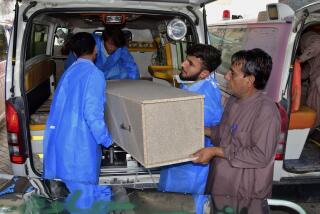Pakistan bus attack targets religious community; more than 40 slain
- Share via
Reporting from Islamabad, Pakistan — At least 43 people were killed and 13 wounded Wednesday when armed men opened fire on a bus carrying members of the Ismaili community, a sub-sect of Shiite Islam, in Pakistan’s largest city, Karachi.
Provincial police chief Ghulam Haider Jamali said 60 people were on board the bus when six gunmen riding motorcycles stopped the vehicle, walked inside and opened fire indiscriminately with 9-millimeter pistols before fleeing.
Sixteen women were among the dead, Jamali said.
The passengers were reportedly traveling to a house of worship in a bus that belonged to an Ismaili welfare society.
It was the worst attack in recent memory against Pakistan’s Ismailis, widely regarded as a progressive and largely apolitical community whose members are prominent in the health and education sectors. In 2013, four people were killed and more than 40 injured in an attack by members of the Pakistani Taliban, an extremist group that views Shiites as heretics.
As security has deteriorated in much of Pakistan, Ismailis had been spared the worst of the violence. The bus that was attacked Wednesday was traveling without any security, a sign that the group had not felt itself to be a major target, said Amir Rana, an Islamabad-based security expert and head of the Pakistan Institute of Peace Studies.
Pakistani militant groups have been seeking out “soft targets” such as the Ismaili community since the army launched an offensive against extremist hideouts in the northern tribal belt in mid-2014, Rana said.
More than 160 Shiites have been killed in Pakistan so far this year, far more than in all of 2014, which had seen a substantial drop in sectarian violence, according to the South Asia Terrorism Portal, which studies the issue.
“The lives of minorities, whether they are religious, ethnic or sectarian, have been becoming more difficult with every passing day,” said Tauseef Ahmed Khan, former chairman of the Department of Mass Communication at Federal Urdu University in Karachi.
Pakistani security officials say they have killed more than 700 Taliban members in Karachi, a teeming port city, over the last few months. But Khan and others say the killings of militants won’t stop the violence in a city that is awash with weapons.
“The most important thing is to stop the flow of arms in the city,” Khan said, adding that the killings were the result of growing sectarian divisions.
“This is all because of a particular mindset. The state will have to work on changing that mindset,” he said.
Karachi police officials reported finding pamphlets at the scene of the attack that referred to involvement by Islamic State, the insurgent group based in Iraq and Syria that has been trying to gain a toehold in South Asia. Investigators said the materials contained no information about the attack and could have been planted as a diversion.
Jundullah, a splinter group of the Pakistani Taliban, claimed responsibility for the attack. The group has targeted Shiites, foreign tourists and security officials in the past, and in November declared allegiance to Islamic State.
Special correspondent Sahi reported from Islamabad and staff writer Bengali from Mumbai, India.
More to Read
Sign up for Essential California
The most important California stories and recommendations in your inbox every morning.
You may occasionally receive promotional content from the Los Angeles Times.














